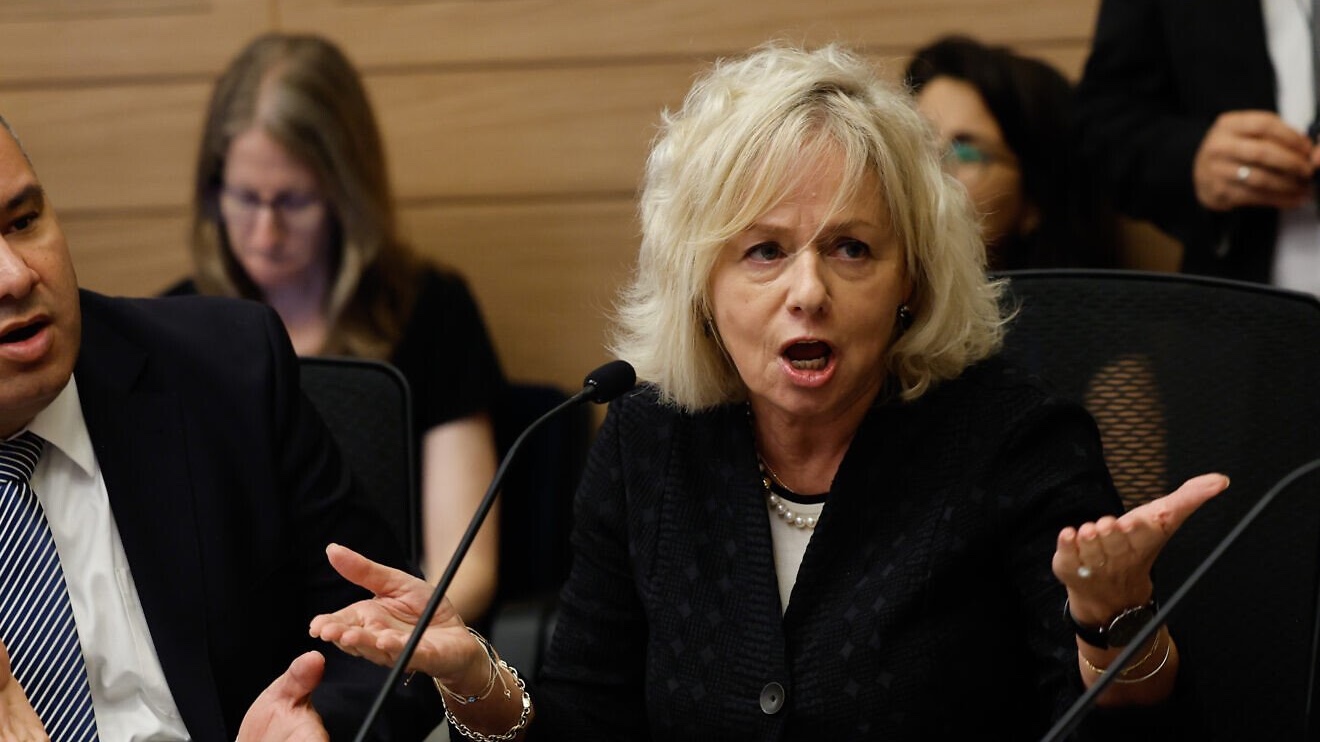(JNS) The Knesset Constitution, Law and Justice Committee is debating proposed legislation that would substantially redefine the role of the attorney general.
Sponsored by MKs Simcha Rothman, Ohad Tal and Michal Waldiger of the Religious Zionism Party, the bill proposes dividing the attorney general position into three roles—a government legal adviser, a prosecutor general and legal representation before the courts. The bill aims to reduce institutional conflicts of interest in the current role and eliminate the concentration of power in the hands of a single person.
The AG position would essentially be redefined as the government’s legal adviser (incidentally the current Hebrew title of the position). The bill clearly states that the attorney general would advise the Cabinet on any legal matter at the request of the Cabinet or ministers.
The AG’s role would be to help the government achieve its goals and policies and he or she would be required to suggest legal options for doing so. The attorney general’s legal opinion would be binding only if adopted by a Cabinet decision. However, this binding effect applies only to the executive branch and does not extend to the Knesset or the state comptroller. The justice minister would oversee the AG and would be accountable to the Cabinet.
The second position would be the prosecutor general, appointed by the justice minister with the approval of the Knesset’s Constitution, Law and Justice Committee. The prosecutor general’s duties would include criminal investigations and indictments.
Finally, the justice minister would be responsible for appointing counsel to represent the government in court. Their duties would include initiating civil or administrative suits involving the state and representing the state in such cases. The government’s counsel would be overseen by the justice minister, not by the attorney general. The government would have the ability to replace its counsel if any serious disagreement prevents them from effectively representing the government’s position.
Not defined by any law
The current powers of the attorney general are highly unusual and even unmatched in democratic countries. According to Israeli jurist Eitan Levontin, “There is no such thing, to the best of my understanding, in any other place. The legal situation in Israel is not a minority opinion, but rather a single opinion, and it seems to me that a chasm, not just a disagreement, lies between it and the legal situation in any comparable country.”
The AG’s powers are not defined by any law and were initially developed from the British colonial administration. In 1997, the government established the Shamgar Commission following the Bar-On-Hebron political scandal. The commission recommended that the government should only be allowed to remove the attorney general for specific reasons, including an inability to work together. The government accepted the conclusions of the Shamgar report.
Over the decades, the attorney general’s powers have steadily grown. In the early years of the state, the attorneys general considered themselves duty-bound to represent the government’s position before the court faithfully. Notably, in the 1993 Deri ruling, the Supreme Court refused to consider Prime Minister Yitzhak Rabin’s stance on dismissing Interior Minister Arye Deri, due to the AG’s refusal to defend it. Justice Eliyahu Matza stated that “the prime minister, with all due respect, could not be heard on these grounds at all.”
The current attorney general, Gali Baharav-Miara, often refuses to defend the government’s position before the court. In one notable instance, in 2024, she declined to defend the government’s appointment of Odelia Minnes as temporary chair of the Second Authority for Television and Radio, while also denying Communications Minister Shlomo Karhi the right to obtain independent counsel.
The Supreme Court issued a rare rebuke of Baharav-Miara, noting that there was no reason for Karhi to be denied representation, nor for Minnes’s appointment to be annulled. The Minnes case highlights the danger of an unchecked attorney general and the potential for abuse if they are not subject to democratic oversight.
The 1993 Deri decision is also the only source supporting the view that the AG’s legal opinion is binding. The surreal Orli Ben-Ari case highlights the risks of allowing a legal adviser to impose his or her views on elected officials. In December 2019, as State Attorney Shai Nitzan’s term ended, Justice Minister Amir Ohana attempted to appoint Ben-Ari as his acting replacement. This move was immediately and strongly opposed by Attorney General Avichai Mandelblit, who called the appointment “extremely outside the bounds of reasonableness” and legally flawed, effectively exercising his veto power over the minister’s discretion.
Mandelblit argued that the only suitable and “reasonable” candidate was his colleague, Deputy State Attorney for Criminal Matters Shlomo Lamberger. After a petition from the Movement for Quality Government in Israel was filed with the Supreme Court, sitting as the High Court of Justice, a judge issued an interim order to halt the appointment minutes before the planned ceremony. As a result of the intense legal and public pressure surrounding the veto, Ben-Ari withdrew her consent, leading to the minister’s preferred candidate being blocked by the AG and the courts. This incident underscored a significant and immediate conflict over the boundaries of executive authority versus the legal establishment’s power.
Subordinate to the government
In sharp contrast to the Israeli model, the role of the attorney general in major common-law countries such as the United States, Canada and the United Kingdom is primarily political and subordinate to the elected government. In the US, the attorney general is a Cabinet member leading the Department of Justice, serving at the pleasure of the president, and is supported by legal experts who are also subordinate to him.
Similarly, in the UK and Canada, the attorney general is a minister of the Crown (or Cabinet member) appointed and dismissible by the prime minister.
This political accountability ensures that while legal advice is professional, it is not binding, and the government retains the final authority to make decisions and seek legal counsel. This arrangement sharply differs from the Israeli AG, who functions as an unelected legal figure with the power to challenge and effectively veto the executive’s decisions.
Excessive power
Shimon Nataf, a doctor of juridical science (JSD) candidate at Columbia University and former legal aid to Rothman, argues that splitting the AG’s role is “vital for the rule of law and the principle of popular sovereignty.”
Nataf criticizes the current setup, calling it “absurd” because the attorney general simultaneously serves as the government’s binding legal adviser and as the chief prosecutor, who can file indictments against ministers. This dual role concentrates excessive power, allowing the same person managing a criminal case against the prime minister to “sit beside him in Cabinet meetings and provide legal counsel.”
According to Nataf, this conflation of authority has damaged the “reliability of the criminal prosecution and public trust in it.”
The split is therefore considered of “critical importance” to two primary objectives: to restore the balance of power “to the hands of the public’s representatives,” and “to remove politics from the general prosecution system.”
Public trust and governability
By contrast, the left-leaning, Tel Aviv-based Tachlith Institute research organization, in a memo submitted to the Knesset, argues that the bill is a radical, sweeping reform that lacks adequate preparatory groundwork and risks destabilizing Israel’s governance.
According to Tachlith, the bill would strengthen the government’s control and subordinate new officeholders to the incumbent government. The institute contends that this shift prioritizes accountability and control over the values of independence and professionalism, threatening the justice system, eroding public trust and undermining governability.
Tachlith warns against the creation of a politically oriented prosecutor general lacking independent safeguards, which could lead to the weaponization of criminal proceedings in Israel’s polarized environment; the unjustified separation of advisory and representational functions, which are naturally interconnected and necessary for effective governance; and the politicization of the AG’s functions, which would disrupt the non-partisan character of the civil service, increase friction with the courts, and ultimately cause inefficiency and deeper judicial involvement in governmental operations.
Elad Gil, head of research at Tachlith, said that “Absent comprehensive professional groundwork and a serious examination of the delicate balances between professionalism, independence, accountability and statehood, reforms of this magnitude may result in substantial harm to governmental effectiveness, the functioning of legal institutions and public trust.”
The proposed legislation aims to resolve institutional conflicts and restore the balance of power to elected officials. While supporters argue this is essential for ending the “unmatched” influence of an unelected legal figure and ensuring government accountability, opponents warn that the reform could politicize the justice system and erode public trust. The main debate focuses on whether moving toward greater political control will uphold popular sovereignty or dangerously undermine the independence of Israel’s key legal institutions.















I would like to see the present AG replaced by someone who, who seeks the will of Hashem, maybe a Torah scholar ?